Fenugreek Seeds For Weight Loss: 4 Ways To Use & Benefits
Shed those pounds and improve your metabolism with this powerful herb.
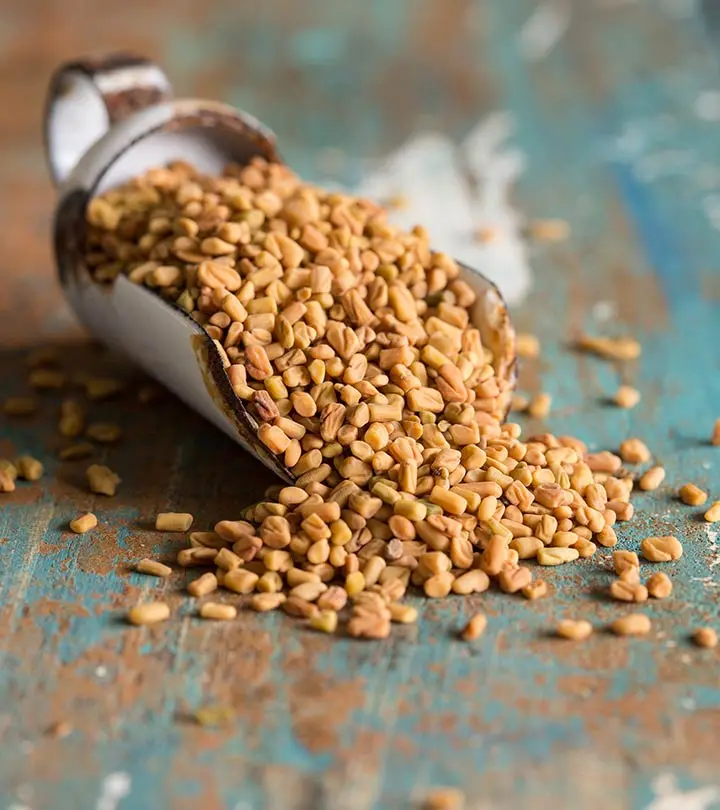
Image: Shutterstock
Fenugreek seeds are excellent for weight loss. Also known as methi in Hindi (Trigonella foenum-graecum), they help lower blood sugar, increase insulin sensitivity, and reduce inflammation. This powerful, natural, nutrition-rich weight loss remedy must be included in your diet if you want to lose weight.
Fenugreek seeds contain galactomannan, a water-soluble heteropolysaccharidei It contains different varieties of monosaccharides (sugars). Hyaluronic acid, often used for skin treatments, is an example. . It reduces fat accumulation and curbs hunger by increasing satietyi A sense of fullness and satisfaction marked by the absence of hunger or need and/or desire to consume more food. (1).
This post discusses how fenugreek seeds aid weight loss, their benefits, and how to use them. Scroll down!
In This Article
Benefits Of Fenugreek Seeds For Weight Loss
Fenugreek seeds aid weight loss by reducing fat accumulation, suppressing appetite, improving metabolic rate, and enhancing digestion.
1. Rich In Fiber
Fenugreek seeds are highly nutritious and have a high fiber content.
One teaspoon (3.7 g) of fenugreek seeds provides 0.9 g of protein and 1 g of fiber (2). The main dietary fiber present in fenugreek (methi) seeds is galactomannan, which was shown to inhibit fat accumulation in rat studies (1).
2. Suppress Appetite
Drinking fenugreek tea benefits your weight loss goals as it may curb hunger by suppressing your appetite. A study on overweight Korean women showed that drinking fenugreek tea before lunch helped reduce their food intake and hunger (3).
Another Malaysian study showed that the addition of 5.5 g of fenugreek seeds powder to rice or bread significantly increased satiety in overweight and obese individuals (4). Hence, incorporating fenugreek in the daily diet may help with weight management.
3. Improve Digestion
Drinking fenugreek water after meals can help improve digestion by accelerating the secretion of digestive juices.
An eight-week study on animals showed that a spice diet (with 2% fenugreek) increased pancreatic lipasei An enzyme secreted by the pancreas to help the digestion of fats, fat soluble vitamins, and cholesteryl ester. activity and stimulated digestion (3.0.CO;2-D”>5).
4. Improve Metabolic Health
You may also use fenugreek for diabetes management. Fenugreek supplementation can improve metabolic parameters and aid weight loss. In a study, 25 adult individuals with type 2 diabetes were given fenugreek seeds extract and assessed for insulin sensitivity and lipid biomarkersi Short for biological markers, they are measures of events occurring within cells or organisms. . It was found that fenugreek reduced insulin resistance, improved HDL cholesterol levels, and decreased triglyceridei A type of fat found beneath the skin that stores energy from excess calories the body doesn’t need to perform crucial functions. levels (6). All these parameters need to be checked if your BMI is more than 25 kg/m2.
5. May Regulate Blood Sugar Levels
Fenugreek seeds are an excellent addition for anyone trying to reduce weight while keeping their blood sugar levels in check because they can help control blood sugar levels (7). Fenugreek seeds’ high fiber content may increase insulin sensitivity. This helps regulate blood sugar levels, reducing spikes and promoting a more stable energy balance.
Note: Fenugreek seeds powder or methi water can aid weight loss if balanced with other holistic approaches. Drinking methi water does not help in spot weight reduction, but it can help improve the metabolic rate and aid digestion. This, in turn, can help reduce internal inflammation and bloating. Hence, start exercising, eat healthy (with proper portion control), and drink methi water for weight loss.
Key Takeaways
- Fenugreek seeds are rich in fiber and may promote digestion
- These seeds may improve your metabolism and insulin resistance,
- They may reduce fat accumulation, and suppress appetite.
- You can consume water-soaked fenugreek seeds or make fenugreek tea.
How To Use Fenugreek Seeds For Weight Loss
Given below are a few recipes that can help you lose weight:
1. Water-soaked Fenugreek Seeds
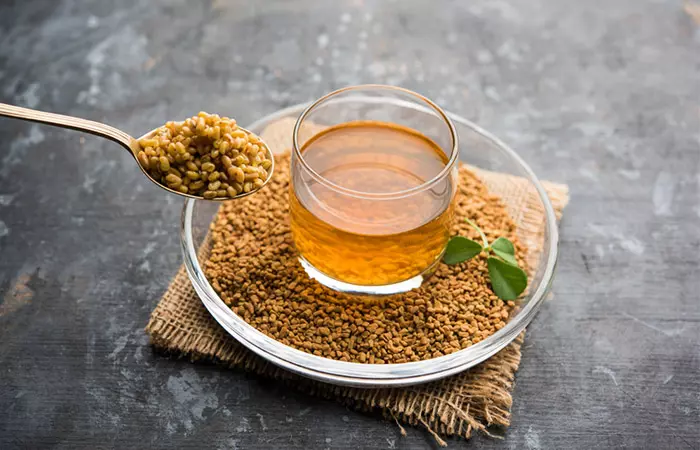
What You Need
- 1 tablespoon of fenugreek seeds
- 2 glasses of water
How To Prepare
- Soak one tablespoon of fenugreek seeds in two glasses of water and leave them overnight.
- Filter the seeds from the water in the morning.
- Chew on the wet seeds on an empty stomach or drink 250-500 mL of fenugreek water to lose weight.
2. Fenugreek Tea

What You Need
- 1 teaspoon of fenugreek seeds
- 1 cup of water
- Cinnamon or ginger (for taste)
How To Prepare
- Grind the fenugreek seeds in a mortar or grinder with a little water until you obtain a fine paste.
- Boil water in a pan.
- Add the paste to the boiling water.
- Add other herbs (cinnamon or ginger) for taste.
- Cover the lid of the pan and lower the flame.
- Allow the tea to simmer for 5 minutes.
- Sip on the fenugreek tea on an empty stomach.
 Quick Tip
Quick Tip3. Sprouted Fenugreek Seeds
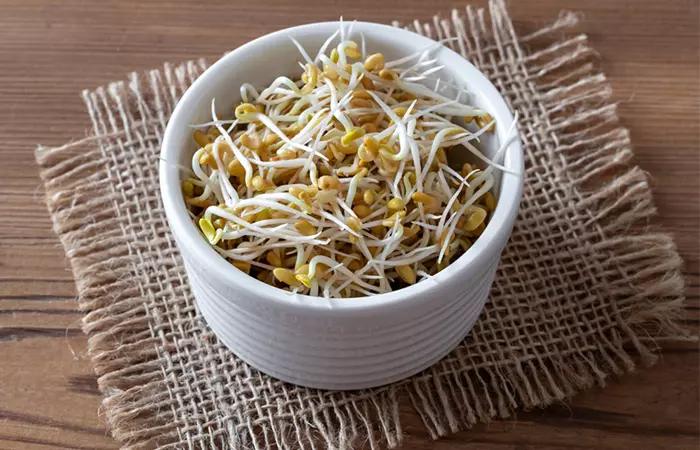
What You Need
- Fenugreek seeds
- Moist cloth for sprouting
How To Prepare
- Soak fenugreek seeds in water.
- Place them on a moist cloth and press with a stone/heavy utensil.
- Keep it aside for three nights.
- Remove the stone/heavy utensil.
- Let the sprouts grow to a decent length before you consume them.
Note:Fenugreek sprouts benefit
your digestive health deliciously. However, if you are consuming it for weight loss, you may have them first thing in the morning, on an empty stomach. You may mix them with your salads or just add a dash of lemon juice before consuming them.
 Quick Tip
Quick Tip4. Fenugreek And Honey Drink

What You Need
- Fenugreek seeds
- Organic honey
How To Prepare
- Make a coarse paste of fenugreek seeds with a stone mortar.
- Boil water in a pan and add the crushed seeds to it. Allow the mixture to cool down and rest for three hours in the pan.
- Strain the water into a cup.
- Add honey and lemon juice to the cup of herbal tea.
- Drink this every morning for best results.
Fenugreek Weight Loss Dosage

The dosage of fenugreek seeds varies according to the condition. For effective weight loss, you can take 2-5 g of whole fenugreek seeds. However, there is no scientific evidence to establish the right dosage. Hence, consult your dietitian or doctor if you want to incorporate fenugreek into your diet.
Valerie Maclin, an experienced nutritionist, says, “For weight loss, I suggest 1 teaspoon of fenugreek seeds 3 times per day. At higher doses, fenugreek may cause gastrointestinal issues, so start low and build up gradually. Once at your goal weight, decrease to 1/2 teaspoon 2-3 times per day to aid maintenance without discomfort. The key is finding the right amount for you.”
Note: Before beginning any new supplement, including fenugreek, it is essential to speak with a healthcare provider to be sure it aligns with your dietary requirements and health goals.
While the benefits of fenugreek seeds are renowned, they do possess potential side effects that warrant attention. Learn more about it in the next section.
Side Effects Of Fenugreek Seeds
While fenugreek seeds are generally safe to consume, some individuals may experience gastrointestinal discomfort, including bloating, gas, and diarrhea. These digestive issues may be attributed to the high fiber content in fenugreek. Additionally, excessive consumption of fenugreek may lower blood sugar levels, making it unsuitable for those with diabetes or taking medication to regulate their blood sugar (8). Furthermore, fenugreek may cause allergic reactions in some people (9). Thus, while fenugreek offers numerous health benefits, it is important to exercise moderation when consuming it. It is advised to consult with a healthcare professional, particularly if you have underlying medical conditions, to avoid these potential side effects.
Infographic: How To Use Fenugreek Seeds For Weight Loss
Fenugreek seeds are high in fiber and contain active ingredients that help reduce fat accumulation. Incorporating them into your diet can facilitate weight loss and improve digestion, and there are many easy ways to do that. Check out the infographic below to learn about some of the effective ways to use fenugreek seeds for weight loss. Illustration: StyleCraze Design Team

So, it’s clear that fenugreek benefits not only your health, but this spice can support your weight loss journey. Fenugreek seeds are rich in fiber, minerals, and vitamins A, B1, B2, and C, and contain a water-soluble compound called galactomannan, which has been shown to act as a natural appetite suppressant and a fat burner (10). In addition, there is scientific evidence to suggest that fenugreek seeds may improve digestion and metabolism. You may take fenugreek seeds for weight loss in a variety of ways, like drinking fenugreek tea, eating fenugreek sprouts, and adding fenugreek powder to meals. However, for long-term weight loss, simply consuming fenugreek tea or seeds is not enough. If you exercise, eat a balanced diet, and use other lifestyle management techniques, fenugreek seeds can facilitate your weight loss.
Frequently Asked Questions
How much fenugreek should I take for weight loss?
There is no proven scientific evidence regarding the safe dosage of fenugreek seeds for weight loss. But you can include 2-5 g of whole seeds in your diet or soak them in water to make a cup of fenugreek tea.
Can I drink fenugreek water every day?
Yes, you can. But ensure you consult your dietitian or doctor before using fenugreek for weight loss purposes.
Can I take fenugreek at night?
You may take fenugreek at night, especially after a carb-rich meal. However, it is commonly recommended that you take fenugreek seeds (that have been soaked overnight) early in the morning on an empty stomach for weight loss benefits.
Illustration: Fenugreek Seeds For Weight Loss- 4 Ways To Use & Benefits
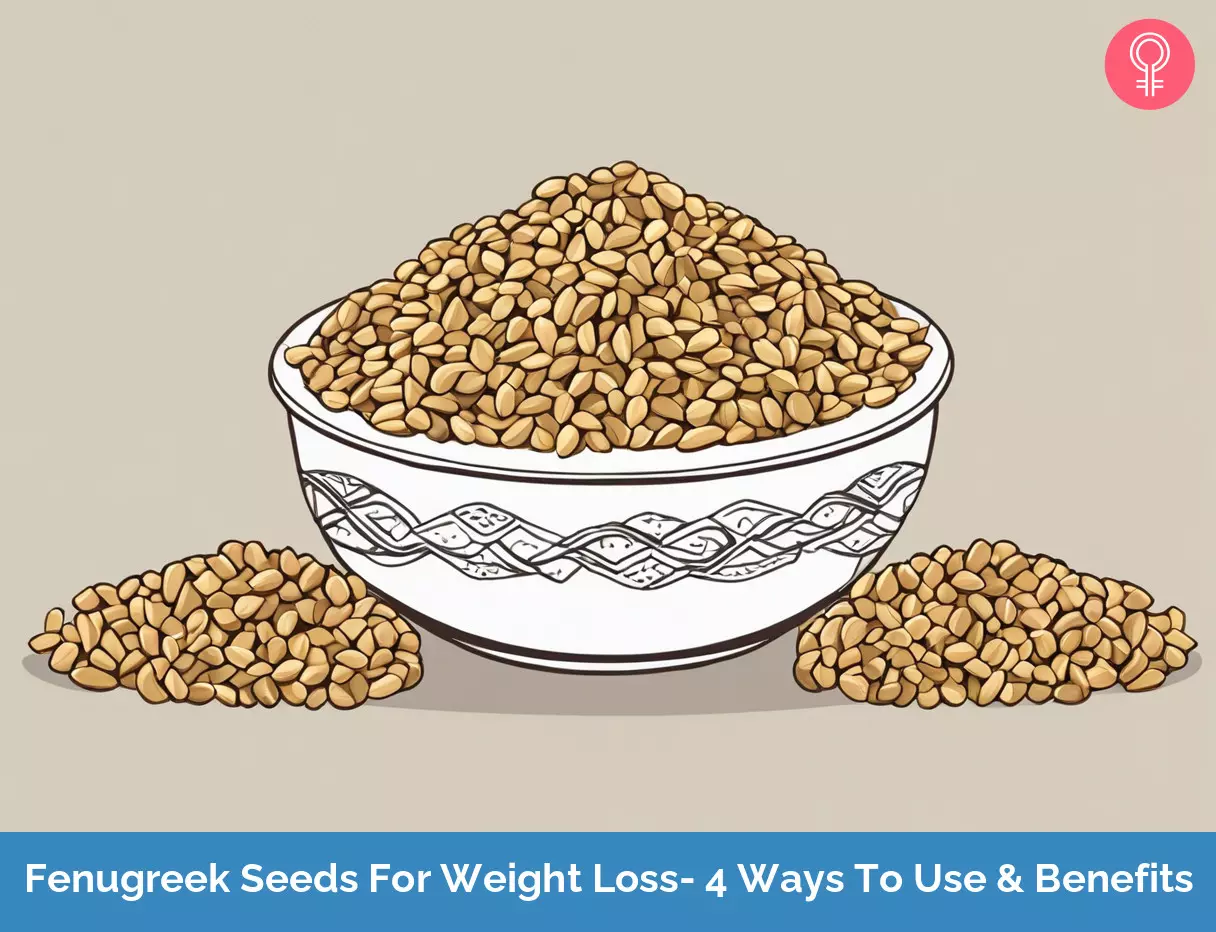
Image: Stable Diffusion/StyleCraze Design Team
Discover the health benefits of fenugreek with this informative video. Learn about its potential impact on various aspects of well-being.
References
Articles on StyleCraze are backed by verified information from peer-reviewed and academic research papers, reputed organizations, research institutions, and medical associations to ensure accuracy and relevance. Read our editorial policy to learn more.
- Fenugreek Seed Extract Inhibit Fat Accumulation and Ameliorates Dyslipidemia in High Fat Diet-Induced Obese Rats, BioMed Research International, US National Library of Medicine, National Institutes of Health.
https://www.ncbi.nlm.nih.gov/pmc/articles/PMC4020548/ - Nutritive Value of Spices, Fenugreek Seeds, U.S. Department of Agriculture.
https://fdc.nal.usda.gov/fdc-app.html#/food-details/171324/nutrients - Fennel (Foeniculum vulgare) and Fenugreek (Trigonella foenum-graecum) Tea Drinking Suppresses Subjective Short-term Appetite in Overweight Women, Clinical Nutrition Research, US National Library of Medicine, National Institutes of Health.
https://www.ncbi.nlm.nih.gov/pmc/articles/PMC4525133/ - Trigonella Foenum-Graecum Seeds Lowers Postprandial Blood Glucose in Overweight and Obese Individuals, Journal of Nutrition and Metabolism, US National Library of Medicine, National Institutes of Health.
https://www.ncbi.nlm.nih.gov/pmc/articles/PMC4167814/ - Influence of dietary spices and their active principles on pancreatic digestive enzymes in albino rats, Molecular Nutrition & Food Research, Wiley Online Library.
3.0.CO;2-D” rel=”noopener noreferrer”>https://onlinelibrary.wiley.com/doi/abs/10.1002/(SICI)1521-3803(20000101)44:1%3C42::AID-FOOD42%3E3.0.CO;2-D - Effect of Trigonella foenum-graecum (fenugreek) seeds on glycaemic control and insulin resistance in type 2 diabetes mellitus: a double blind placebo controlled study, The Journal of the Association of Physicians of India, US National Library of Medicine, National Institutes of Health.
https://pubmed.ncbi.nlm.nih.gov/11868855/ - The Effect of Fenugreek in Type 2 Diabetes and Prediabetes: A Systematic Review and Meta-Analysis of Randomized Controlled Trials
https://www.ncbi.nlm.nih.gov/pmc/articles/PMC10531284/ - Effect of fenugreek seeds on blood glucose and serum lipids in type I diabetes European journal of clinical nutrition US National Library of Medicine National Institutes of Health.
https://pubmed.ncbi.nlm.nih.gov/2194788/ - Characterization of potential allergens in fenugreek (Trigonella foenum-graecum) using patient sera and MS-based proteomic analysis Journal of Proteomics US National Library of Medicine National Institutes of Health.
https://www.ncbi.nlm.nih.gov/pmc/articles/PMC2894366/ - Fenugreek a multipurpose crop: Potentialities and improvements
https://www.ncbi.nlm.nih.gov/pmc/articles/PMC4894452/
Read full bio of Merlin Annie Raj
- Valerie Maclin has over 27 years of experience in the health and wellness industry, giving her unique and strategic insight into the driving factors behind weight gain and sustainable weight loss. Having helped thousands of clients through the years, she has developed a weight loss program that is backed by life-changing results. She believes that while losing weight is important, lifestyle changes are what ensure long-term success
 Valerie Maclin has over 27 years of experience in the health and wellness industry, giving her unique and strategic insight into the driving factors behind weight gain and sustainable weight loss. Having helped thousands of clients through the years, she has developed a weight loss program that is backed by life-changing results. She believes that while losing weight is important, lifestyle changes are what ensure long-term success
Valerie Maclin has over 27 years of experience in the health and wellness industry, giving her unique and strategic insight into the driving factors behind weight gain and sustainable weight loss. Having helped thousands of clients through the years, she has developed a weight loss program that is backed by life-changing results. She believes that while losing weight is important, lifestyle changes are what ensure long-term success
Read full bio of Arshiya Syeda
Read full bio of Moksha Gandhi






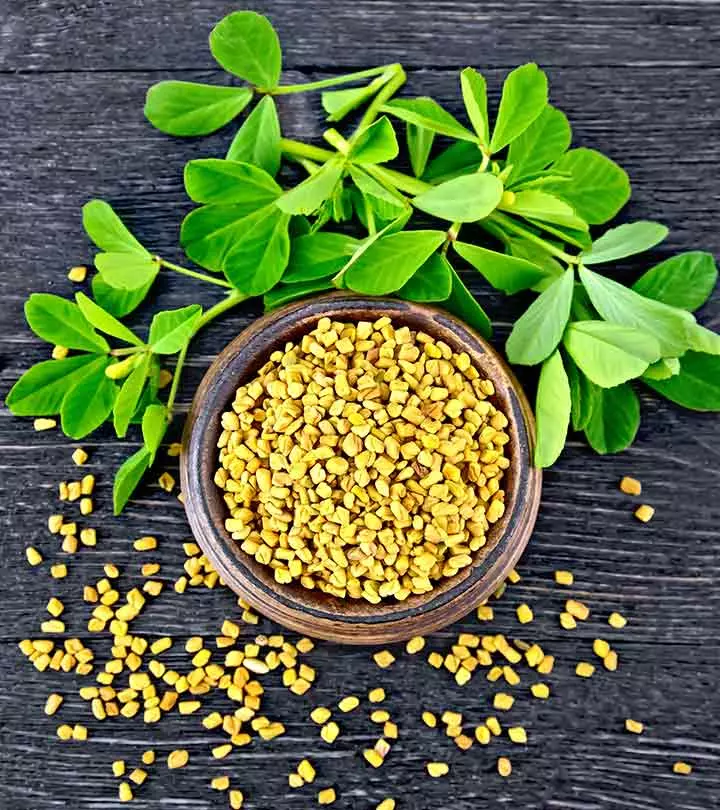



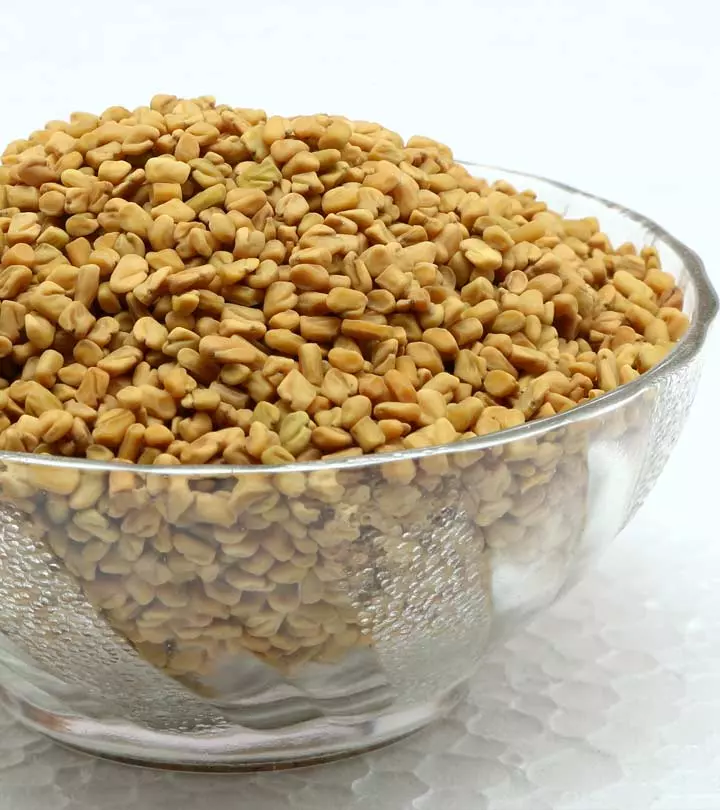

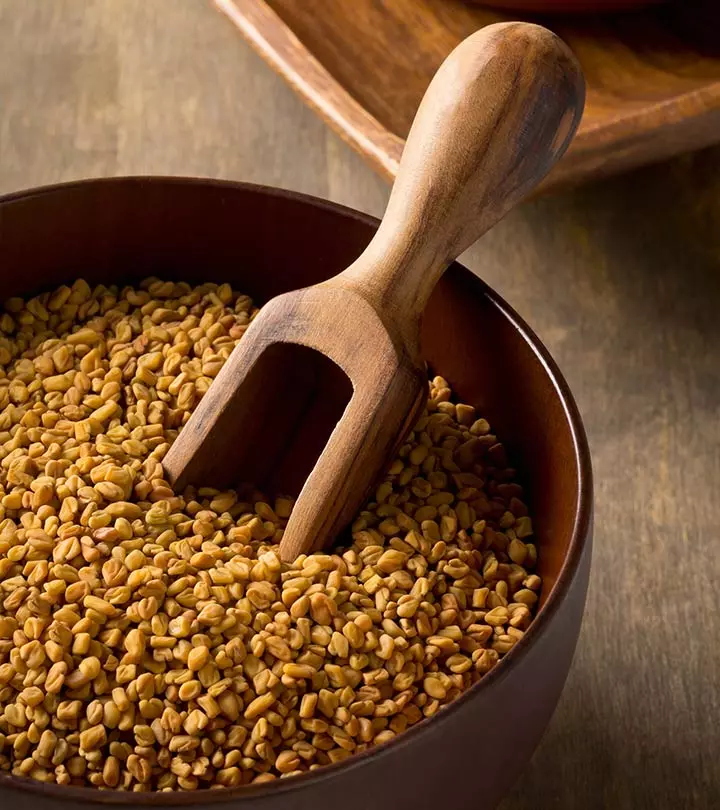




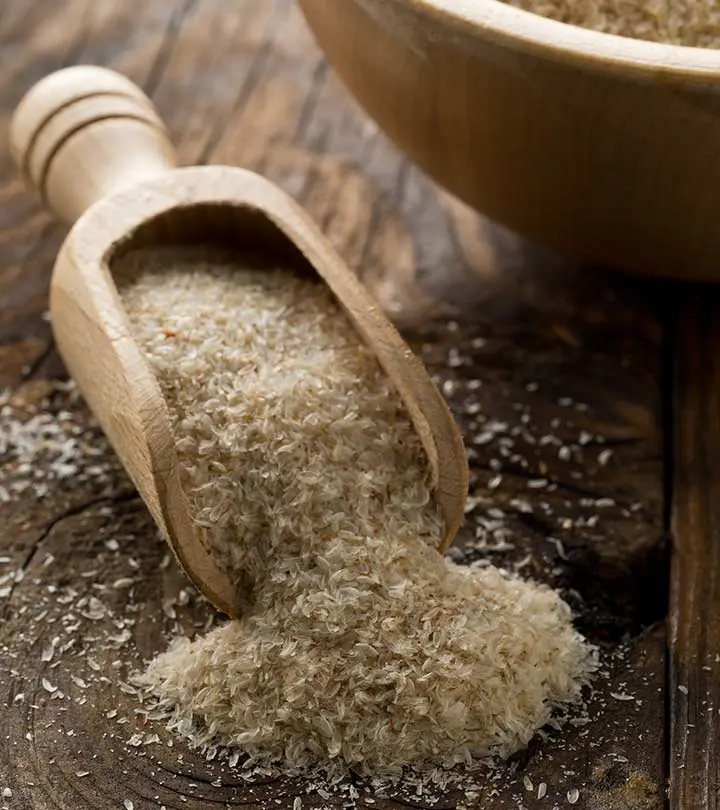









Community Experiences
Join the conversation and become a part of our empowering community! Share your stories, experiences, and insights to connect with other beauty, lifestyle, and health enthusiasts.